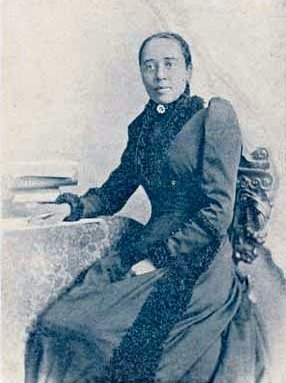 Anna Julia Cooper (1858-1964) graduated from the Sorbonne in 1925, aged 67, becoming only the fourth African American woman to gain a doctorate. Her dissertation was titled L’attitude de la France à l’égard l’esclavage pendant la revolution and was subsequently translated into English by Frances Richardson Keller under the title Slavery and the French and Haitian Revolutionists. The book presents the powerful argument that, had the white French revolutionaries taken the issue of slavery seriously and both abolished slavery and renounced empire, they could have shaped the revolution to more favourably address their concerns of equality and liberty. The book stands alongside CLR James’ more known Black Jacobins and offers a rigorous and scholarly analysis of the politics in the metropole oriented around understandings of racial equality as well as providing an account of the events that led to the emergence of Toussaint L’Ouverture as the key revolutionary figure.
Anna Julia Cooper (1858-1964) graduated from the Sorbonne in 1925, aged 67, becoming only the fourth African American woman to gain a doctorate. Her dissertation was titled L’attitude de la France à l’égard l’esclavage pendant la revolution and was subsequently translated into English by Frances Richardson Keller under the title Slavery and the French and Haitian Revolutionists. The book presents the powerful argument that, had the white French revolutionaries taken the issue of slavery seriously and both abolished slavery and renounced empire, they could have shaped the revolution to more favourably address their concerns of equality and liberty. The book stands alongside CLR James’ more known Black Jacobins and offers a rigorous and scholarly analysis of the politics in the metropole oriented around understandings of racial equality as well as providing an account of the events that led to the emergence of Toussaint L’Ouverture as the key revolutionary figure.
Having been born under slavery in the southern US, it is perhaps not surprising that the condition of slavery and the ongoing question of racial equality should be predominant features of her analytical work. She was active in the civil rights movement and also argued strongly for women’s rights. She is seen by many as one of the first scholars of US Black feminism. Her first book, published in 1892, A Voice from the South: By a Black Woman of the South, acutely examines the challenges to equality posed by white Southern society and the particular contribution to be made by African American women to social and political transformation. As Kathryn Sophia Belle (published as Kathryn Gines) has noted, Cooper’s Voice was published before significant works by her contemporaries, Booker T Washington or WEB DuBois, but she has been largely neglected even from the canon of African American scholarship.
Essential Readings
Cooper, Anna Julia 1892. A Voice from the South: By a Black Woman of the South
Cooper, Anna Julia 1902. “The Ethics of the Negro Question” (pdf)
Cooper, Anna Julia [1925] 2006. Slavery and the French and Haitian Revolutionists: L’attitude de la France à l’égard de l’esclavage pendant la revolution, edited and translated by Frances Richardson Keller, reprinted Rowman & Littlefield.
Further Readings
Bailey, Catherine 2004. “Anna Julia Cooper: ‘Dedicated in the Name of My Slave Mother to the Education of Colored Working People’” in Hypatia, Volume 19, Number 2, Spring .
Guy-Sheftall, Beverly, 2009. “Black Feminist Studies: The Case of Anna Julia Cooper”, African American Review: Special Section on Anna Julia Cooper, Volume 43, Number 1, Spring
May, Vivian M. 2004 “Thinking from the Margins, Acting at the Intersections: Anna Julia Cooper’s A Voice from the South” in Hypatia, Volume 19, Number 2, Spring .
May, Vivian M. 2008. ‘“It is Never a Question of the Slaves”: Anna Julia Cooper’s Challenge to History’s Silences in Her 1925 Sorbonne Thesis,’ Callaloo 31 (3): 903–918.
Questions
Discuss the claim that Cooper is the mother of Black feminism in the US
What is Cooper’s vision of racial equality and how does she believe it could be achieved, if at all, within the US?
Compare and contrast Cooper’s analysis of the relationship between the French and Haitian revolutions with that provided by CLR James in The Black Jacobins
Submitted by Gurminder K Bhambra